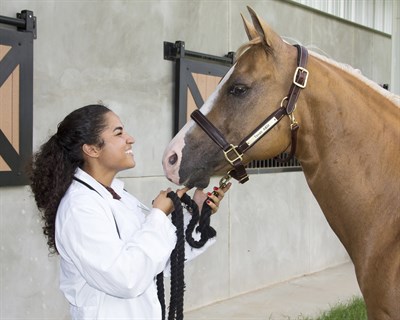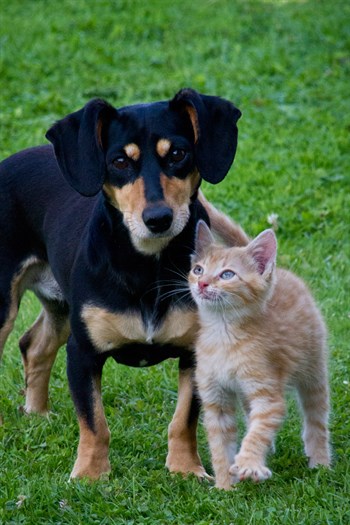Pet Talk
Dog Park Etiquette
Does your dog need a change of scenery? Consider taking Fido to the dog park, where he or she can play, exercise, and socialize with other dogs and people. These activities can benefit your dog both physically and mentally. But that doesn’t mean Fido should be free to roam the park without your supervision. Kit […]
Keep your pets safe this Halloween
Children and adults may love the spooky traditions of Halloween, but our pets are less likely to appreciate the costumes, masks, and parties associated with Halloween night. Kit Darling, infection control coordinator at the Texas A&M College of Veterinary Medicine & Biomedical Sciences, recommended a few tips to keep your pet safe this Halloween. “Keep […]
Is your horse safe from Equine Infectious Anemia?
Horses are beautiful and strong creatures, but they still depend on their owners to keep them healthy. One disease horse owners should be aware of is Equine Infectious Anemia (EIA), a virus that can destroy red blood cells, causing weakness, anemia, and death. Dr. Michelle Coleman, assistant professor at the Texas A&M College of Veterinary […]
Amputating a pet’s limb
For many pet owners, the thought of their furry friend losing a limb can be scary or sad. However, pets with certain conditions, such as bone cancer, can benefit from amputating a limb. In fact, in some situations, amputation can actually improve a pet’s quality of life. Dr. Jacqueline Davidson, clinical professor at the Texas […]
Is your pet obese?
Like humans, pets can develop excess body fat that can lead to serious health problems such as diabetes or degenerative joint disease. But how can you tell if your pet has obesity? In recognition of National Pet Obesity Awareness Day on Oct. 11, Dr. Audrey Cook, associate professor at the Texas A&M College of Veterinary […]
Does your pet have a hot spot?
Have you ever noticed your pet excessively licking, biting, or scratching a specific area on their body? This behavior can lead to an infection in the upper layer of the skin otherwise known as pyotraumatic dermatitis, or a “hot spot.” Dr. Alison Diesel, clinical assistant professor at the Texas A&M College of Veterinary Medicine & […]
Adopting adult pets
When considering getting a new pet, we often think of adopting a puppy or kitten. However, adult pets are just as loveable and can sometimes even be a better fit. Dr. Christine Rutter, clinical assistant professor at the Texas A&M College of Veterinary Medicine & Biomedical Sciences, explained the advantages of adopting an adult pet. […]
When is your cat hiding illness or injury?
We do our best to take care of our feline friends, but sometimes signs of pain and sickness go unnoticed. Dr. Stacy Eckman, clinical assistant professor at the Texas A&M College of Veterinary Medicine & Biomedical Sciences, described feline behavior that could mean a cat is hiding an illness, injury, or other underlying health issue. […]
Introducing new pets into the household
Bringing home a new furry friend can be an exciting experience. However, there are a lot of responsibilities to consider in pet ownership, including time, energy, and commitment. After all, pets are a part of the family, too. Dr. Sarah Griffin, lecturer at the Texas A&M College of Veterinary Medicine & Biomedical Sciences, said to […]
September is National Disaster Preparedness Month
When a disaster strikes, there is often little time to prepare our homes, families, and pets for the damage to come. Thankfully, disaster relief teams, such as the Texas A&M College of Veterinary Medicine & Biomedical Sciences’ Veterinary Emergency Team (VET), can help in times of need. Dr. Angela Clendenin, public information officer for the […]












